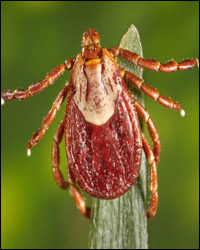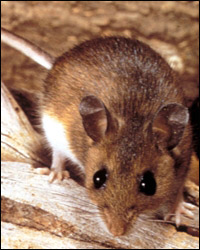Outdoor Safety
 Wherever your outdoor activities take you, there are things you can do to help make sure you avoid deadly diseases.
Wherever your outdoor activities take you, there are things you can do to help make sure you avoid deadly diseases.
Wherever your outdoor activities take you, there are things you can do to help make sure you avoid infectious diseases spread by animals and insects.
Stay Alert for Wild and Unfamiliar Animals
 Wild animals can be found in many outdoor locales. Many of these animals can transmit rabies to people and pets.
Wild animals can be found in many outdoor locales. Many of these animals can transmit rabies to people and pets.
More than 90% of all animal rabies cases reported to CDC each year occur in wild animals. The main animals that get rabies include raccoons, skunks, foxes and bats. One of the best ways to protect against rabies is to avoid contact with wild animals. Do not feed or handle them, even if they seem friendly.
Unfamiliar animals that are often thought of as pets, such as dogs and cats, should also be avoided. These animals are often in contact with wildlife and can also transmit rabies to humans.
If you see an animal acting strangely, report it to animal control. Some things to look for are:
- General sickness
- Problems swallowing
- Lots of drool or saliva
- An animal that appears more tame than you would expect
- An animal that bites at everything
- An animal that's having trouble moving or may even be paralyzed
Sometimes, you may come across a dead animal. Be aware that the animal may have died from rabies. In such cases, call animal control to take care of the animal’s body. If moving or touching the body can’t be avoided before animal control arrives, be sure to wear protective gloves. This can help ensure you’re not exposed to the rabies virus
Protect Yourself Against Ticks
 Many outdoor environments have ticks that can spread diseases, such as Rocky Mountain spotted fever, ehrlichiosis, anaplasmosis, and Lyme disease.
Many outdoor environments have ticks that can spread diseases, such as Rocky Mountain spotted fever, ehrlichiosis, anaplasmosis, and Lyme disease.
Young ticks are so small that they can be difficult to see, but both young and adult ticks can bite people. To help protect yourself from tick bites:
- avoid high grasses, forested and brushy spots, which are the most tick-infested areas —the center of trails and areas with trimmed grass are less attractive to ticks
- wear light-colored clothing so you can see ticks crawling on you.
- use repellent containing 20-50% DEET. You can also treat clothing with permethrin, which protects through several washings. Repellent will keep the mosquitoes away too!
- Keep ticks off your pets (use sprays, collars, or topical medications).
Always follow the directions on repellent packaging. After you have been outside, check your body, your clothing, your children, and your pets for ticks. Here's how to check for ticks, remove them from your clothes and how to remove them from skin safely once they've bitten.
Consult your healthcare provider if you become ill in the 1-3 weeks following a bite. It could be any number of illnesses.
Pesticides, responsible pet care, vegetation-free play areas, and landscaping techniques for tick-free zones can also help limit your exposure to ticks and other insects.
Keep Rodents Outside When You Return Indoors
 Worldwide, rats and mice spread over 35 diseases. These diseases can be spread to humans directly, through handling of rodents, through contact with rodent feces, urine, or saliva, or through rodent bites. Diseases carried by rodents can also be spread to humans indirectly through ticks, mites, or fleas that have fed on an infected rodent.
Worldwide, rats and mice spread over 35 diseases. These diseases can be spread to humans directly, through handling of rodents, through contact with rodent feces, urine, or saliva, or through rodent bites. Diseases carried by rodents can also be spread to humans indirectly through ticks, mites, or fleas that have fed on an infected rodent.
The primary strategy for preventing human exposure to rodent diseases is effective rodent control in and around the home. To achieve this, follow these basic rules: seal, up, trap up, and clean up. This means you should:
- fill any gaps or holes inside and outside your home.
- trap rodents in and around the home.
- eliminate or seal rodent food sources such as pet food, bird feeders, and garbage cans.
- keep outside cooking areas and grills clean.
- elevate hay, woodpiles, and garbage cans at least 1 foot off the ground.
- trim grass and shrubbery within 100 feet of your home.
More Information
Get email updates
To receive email updates about this page, enter your email address:
Contact Us:
- Centers for Disease Control and Prevention
1600 Clifton Rd
Atlanta, GA 30333 - 800-CDC-INFO
(800-232-4636)
TTY: (888) 232-6348 - cdcinfo@cdc.gov




